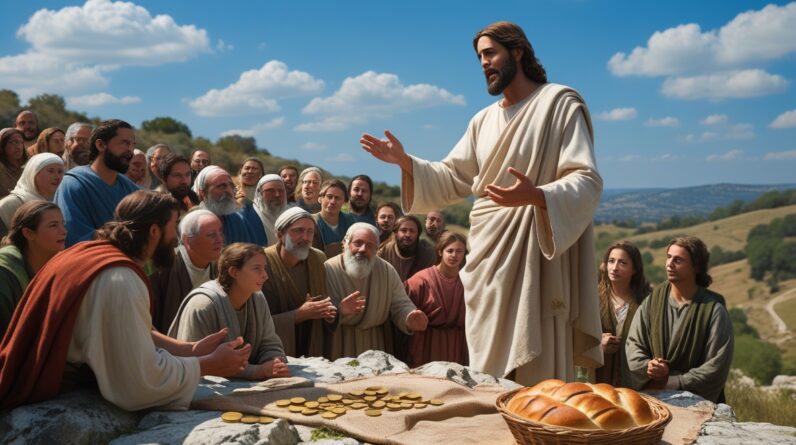5 Biblical Reasons Why Tithing Still Matters Today
You’ve probably heard people ask, “Does tithing still matter?” or “Is tithing an Old Testament law only?” Those are honest questions, and you’re not alone if you wrestle with them. In a world where money shapes what you do and who you become, the practice of giving — especially tithing — deserves careful, biblical thought. This article walks you through five clear, biblical reasons why tithing still matters today, and it does so in a practical, encouraging way so you can apply it to your life right now.
Before we dive into the five reasons, let’s ground ourselves in Scripture and in a pastoral understanding of what tithing is. Historically, the tithe meant giving a tenth of your income or produce back to God as an act of worship and support for the work of God among His people. That concept shows up early in the Bible and is woven through both law and story. You’ll see that tithing isn’t just a ritual; it’s a spiritual discipline that shapes your relationship with God, your trust in His provision, and your role in caring for the community.
Why does this matter to you? Because how you handle money is a window into your heart. Jesus said that where your treasure is, there your heart will be also. Tithing is one of those tangible practices that trains your heart to put God first, to trust God’s provision, and to participate in God’s mission. Throughout what follows, I’ll point you to Scripture so you can read the original passages for yourself and see the biblical foundation. When a verse is referenced, you’ll find a direct link to the NIV text so you can read it in context.
As we go, keep one phrase in mind: why tithing matters. You’ll see it repeated because it helps you stay focused on the question you came here to answer. By the end, you’ll have five solid, biblically-based reasons for why tithing matters today, along with practical steps you can take to make this discipline a healthy part of your walk with God.
A quick note on reading Scripture
If you want to follow up on the verses I reference, click the links to read each passage in the NIV on Bible Gateway. Reading the verses in context will strengthen your understanding and protect you from common misunderstandings about tithing.
Now let’s look at the five biblical reasons.
1) Tithing acknowledges God’s ownership and your stewardship
From the first chapters of Scripture, God is presented as the Creator and Owner of all. When you tithe, you’re acknowledging that everything you have is a gift from Him, not a result of your ultimate control. This truth is foundational to understanding why tithing matters: it corrects the lie that you are the owner and the source of provision.
The practice of returning a portion to God is rooted early. Abraham gave a tenth to Melchizedek after being blessed and victorious in battle, demonstrating that giving back to God is a response to God’s blessing and sovereignty. Read the account here: Genesis 14:20. That event is later referenced in Hebrews to show continuity in God’s order: Hebrews 7:1-10.
On the law side, God’s instructions to Israel made the tithe an institutional practice that taught the people to remember who provided for them. Leviticus makes clear that a tithe is holy — set apart — because it belongs to the Lord: Leviticus 27:30. Deuteronomy also ties the practice to community care and worship: Deuteronomy 14:22-23.
When you live as a steward, you shift from “who owns this?” to “how will I use this to honor God?” That shift changes how you budget, how you give, and how you make decisions. That’s a central reason why tithing matters: it continually reorients your life toward God’s lordship and your role as a manager of His resources.
How this affects you: If you’ve struggled with financial anxiety, try viewing your next budget through the lens of stewardship. Make giving the first line in your budget rather than the last. That one change will teach you trust and reorder your priorities.
2) Tithing fosters trust and dependence on God
Finances are one of the most common sources of worry in your life. When you tithe, you’re taking a spiritual step to combat fear with faith. The tithe is an act of trust: you give away a portion of what you have, often before you see the next paycheck, and you trust God to provide.
Malachi framed tithing as a test of God’s faithfulness: “Bring the whole tithe into the storehouse… test me in this,” God says through the prophet, “and see if I will not throw open the floodgates of heaven.” Read Malachi’s challenge and God’s promise here: Malachi 3:8-10. That promise isn’t a formula for instant wealth, but it is a radical invitation to trust God with your provision.
Jesus taught about God’s care when he urged you not to worry about what you’ll eat or wear, pointing to God’s provision for the birds and flowers, and then saying God knows what you need. Read part of that teaching: Matthew 6:25-34. Giving first is a practical way to exercise the trust Jesus described. You obey, and in the obedience, you train your faith muscles.
Why this is important: One of the reasons why tithing matters is that it forms trust. You learn to release grip on money and to rely on God’s promise. This spiritual discipline helps you build a steady, faith-based approach to the future rather than one driven by anxiety.
How this affects you: Start small if needed. If you can’t immediately tithe a full ten percent, begin by giving consistently and increasing as God provides. The action of giving is what cultivates trust.
3) Tithing supports the work of the church and the care of people
The Bible connects giving directly to the functioning of God’s people and the work of ministry. When you give, you’re investing in worship, in the preaching of the Word, in discipleship, and in meeting the needs of the poor and vulnerable. That practical reality is one of the clearest answers to why tithing matters: your giving makes the church’s mission possible.
In the early church, believers were committed to sharing what they had so that nobody lacked basic needs. Acts describes a community that sold property and possessions to support one another and to care for the needy: Acts 4:34-37. Paul also gave instructions about regular, planned giving in his letters so that the work of ministry could be sustained: 1 Corinthians 16:1-2.
Jesus criticized religious leaders who neglected justice and mercy while obsessing over rituals, suggesting that giving must be integrated with the whole of righteous living: Matthew 23:23. The tithe in the Old Testament supported the Levites, the temple, and the festivals; in the New Testament era, the principle is that believers provide for the leaders and help care for the vulnerable so ministry can continue.
Practical implications for you: Your tithe is not an abstract obligation. It’s the fuel for preaching, for pastoral care, for community outreach, for food banks, for missions, and for ministries that touch people’s lives. When you give faithfully, you are making it possible for your church to love and serve your neighborhood. That’s a compelling reason why tithing matters.
4) Tithing cultivates gratitude and worship
When you give back to God, you are worshiping. It’s easy to separate worship from the rest of life, but the Bible teaches that worship includes acknowledging God with your resources. Tithing is an act of gratitude — a physical expression that says, “God, you are first in my life.”
Proverbs ties giving to worship and blessing: “Honor the LORD with your wealth, with the firstfruits of all your crops; then your barns will be filled to overflowing.” Read that promise here: Proverbs 3:9-10. The phrase “firstfruits” points to priority and to offering God the first and best of what you have, not merely the leftovers.
The tithe helps you practice gratitude regularly. Instead of living with a grudging, tight-fisted attitude, giving cultivates a generous heart. It reshapes your assumptions from “I earned this” to “God has blessed me, and I want to honor Him.” That heart posture is central to Christian maturity. Paul taught about the cheerful giver in the New Testament: 2 Corinthians 9:6-7. Giving with the right heart matters to God.
How this plays out in your life: When you tithe, you create a rhythm of gratitude. On payday, you pause, give, and remember that God is the source. Over time that rhythm becomes natural, and you begin to approach money with thanksgiving rather than anxiety or entitlement. That spiritual formation is why tithing matters: it reorders your affections and fosters worship in everyday life.
5) Tithing disciplines your heart and frees you from materialism
Money can easily become an idol. Jesus starkly warned that you cannot serve both God and money. The practice of tithing disciplines your heart against that idol by forcing you to choose — repeatedly — where your loyalty lies. This discipline has practical benefits: it builds generosity, humility, and freedom from the grip of stuff.
Jesus taught that where your treasure is, your heart will be also. Read part of his teaching here: Matthew 6:19-21. The tithe is a regular, tangible way to set the treasure back where it belongs. It’s a training tool for the soul.
Paul describes a lifestyle of generous giving that counters greed and fosters contentment. He calls the church to support one another and to give even when circumstances are tight, and he emphasizes that God loves a cheerful giver: 2 Corinthians 9:6-8. That teaching connects giving to spiritual freedom — the more you practice generosity, the less enslaved you are to possessions.
Practical steps for breaking materialism: Consider tithing as part of a broader spiritual diet. Pair it with practices like Sabbath rest, simplicity, and generosity to the poor. When giving is regular and sacrificial, it loosens the grip of money and frees you to live for eternal values rather than temporary possessions.
Why all five reasons together matter. When you put these five reasons together — stewardship, trust, church support, worship, and discipline — a coherent picture emerges. Tithing is not a legalistic checkbox. It’s a spiritual practice that shapes your heart, your community, and your witness to the world. That’s why tithing matters: it’s a spiritual lever that impacts individual faith and communal mission.
You might still have questions about how to apply tithing in your specific situation. Let’s walk through some common concerns and practical guidance.

Practical questions and answers
Do you have to give exactly ten percent? The Bible gives examples and instructions about tithing as ten percent, and that number has been a helpful guideline for many believers. The tithe was a clear, simple measure to teach faithfulness, and it still functions that way. But the New Testament emphasizes the heart and generosity more than a strict percentage. Paul encourages generous, planned, cheerful giving: 2 Corinthians 9:6-7.
If you’re disciplined at ten percent, keep going. If ten percent is not realistic right now, be faithful with what you can give and increase as you’re able. The spiritual action matters more than the exact number.
What about emergencies and debts? Tithing doesn’t mean you should ignore financial responsibility. Stewardship includes managing debt, saving, and planning. The tithe should be part of a healthy budget. If you’re in serious debt, rework your budget so you can begin with a smaller percentage and increase it as you get out of debt. The disciplining effect of giving can actually help you prioritize and cut unnecessary spending.
How does tithing relate to offerings and special giving? Tithing is often the baseline — a regular, predictable portion you give. Offerings, benevolence, and special giving are above and beyond the tithe and respond to specific needs and opportunities. Both flows are biblical. The early church practiced radical generosity when needed: Acts 4:34-37.
What if my church mismanages money? Your giving is to God first, but it is appropriate and necessary to ask how funds are used. Biblical stewardship requires transparency and accountability. If you’re concerned about how your church uses resources, engage respectfully with leadership and ask for clarity about budgets and ministries. Your tithes and offerings should support a clear mission and love for the community.
How should you pray about it? Pray about your giving. Ask God to show you what percentage to give, to make your heart joyful in generosity, and to bless the use of the funds for His kingdom. The tithe is a spiritual discipline — not just financial — so keep it in your prayer life and in the life of your family.
How to begin if you’re unsure
Start where you are, not where you wish you were. If you’ve never tithed, try committing to a specific, measurable plan for 90 days. Put it on your calendar. Treat it as worship, and resist the temptation to keep money back out of fear. God calls you to step in faith and provides as you obey. Remember the invitation in Malachi to test God’s faithfulness: Malachi 3:8-10. As you give, track how your heart changes, how your priorities shift, and how your church and community are blessed.
If you’re already tithing, consider the next steps: increase generosity, mentor someone younger in the faith about giving, or start a new ministry of giving in your church. Tithing is not the finish line; it’s a practice that should lead to a lifestyle of generosity.
The character of God displayed through tithing
Another reason why tithing matters is that it helps portray God’s character in the world. He is generous, faithful, and just. When you give, you reflect His generosity. When your church gives to the poor, it shows God’s compassion. When leaders are supported, the preaching of the Word continues. Your tithe participates in God’s work of revealing Himself to a watching world.
Paul’s instructions to the churches were practical and pastoral. He wanted believers to be ready to help, not caught off guard: 1 Corinthians 16:1-2. The tithe helps the church to be ready for ministries, for emergencies, and for opportunities to bless others.
A final pastoral word
If you’ve wrestled with the practice of tithing, know this: God cares more about your heart than your percentage. Yet God also calls you to action. Spiritual growth rarely happens without spiritual disciplines. Tithing is one of those disciplines that trains you in faith, gratitude, and generosity. It’s a means of grace for your financial life.
Why tithing matters is not because God needs your money. It matters because you need the discipline, the trust-building, and the reorientation that tithing brings. God is already rich; your giving is about becoming more like Him.
Read and reflect on the Scriptures I pointed you to. Pray and ask God how He wants you to respond. If you’re part of a local church, talk with your pastor or elders about how your tithes are used. Remember that giving is both private worship and corporate stewardship.
Below are the principal Scriptures referenced in this article so you can study them yourself:
- Genesis 14:20
- Leviticus 27:30
- Deuteronomy 14:22-23
- Malachi 3:8-10
- Proverbs 3:9-10
- Matthew 6:25-34
- Matthew 6:19-21
- Matthew 23:23
- Hebrews 7:1-10
- Acts 4:34-37
- 1 Corinthians 16:1-2
- 2 Corinthians 9:6-8
You’ve read five biblical reasons why tithing matters, and you can see the consistent message across Scripture: giving is worship, stewardship, trust-building, support for God’s work, and a discipline that protects your heart. If you want to follow God more closely in your finances, taking a step of faith toward consistent giving is a time-tested spiritual practice.
Explore More
For further reading and encouragement, check out these posts:
👉 7 Bible Verses About Faith in Hard Times
👉 Job’s Faith: What We Can Learn From His Trials
👉 How To Trust God When Everything Falls Apart
👉 Why God Allows Suffering – A Biblical Perspective
👉 Faith Over Fear: How To Stand Strong In Uncertain Seasons
👉 How To Encourage Someone Struggling With Their Faith
👉 5 Prayers for Strength When You’re Feeling Weak

📘 Jesus and the Woman Caught in Adultery – Grace and Mercy Over Judgement
A powerful retelling of John 8:1-11. This book brings to life the depth of forgiveness, mercy, and God’s unwavering love.
👉 Check it now on Amazon
As a ClickBank Affiliate, I earn from qualifying purchases.
Acknowledgment: All Bible verses referenced in this article were accessed via Bible Gateway (or Bible Hub).
“Want to explore more? Check out our latest post on Why Jesus? and discover the life-changing truth of the Gospel!”








